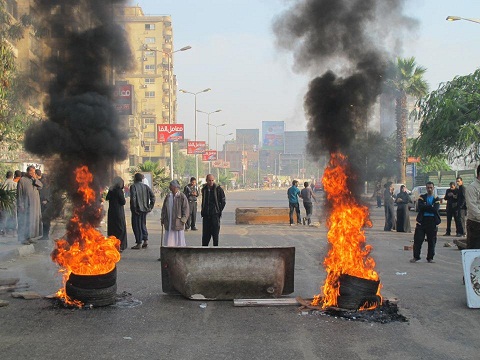CAIRO: The eternal struggle between moderation and extremism is at the heart of the current impasse that has cast its shadow over the Sixth of October headquarters of Islam Online (IOL) over the past week.
Bibi-Aisha Wadvalla who heads the internet radio station for IOL’s website, wrote in a commentary published on The Guardian’s website Thursday that the reason behind the collective staff decision to go on strike last week was that “new management at Al-Balagh Cultural Society, [IOL’s] … holding company in Qatar, imposed their dictates on IOL’s editorial tone, and issued guidelines for rather conservative content leading to a backlash by the entire staff against such editorial interference.
Reporters at Daily News Egypt who spoke to some of IOL’s striking employees were also told that there were warnings of mass layoffs and employee investigations by the Qatari funder and that the contract between Al-Balagh and Media International (which produces the website for Al-Balagh) ends on March 31 and will not be renewed.
More insidiously, employees complained, Qatar changed the password to the server, blocking Egypt’s access to the website.
When the staff sent a petition, complaining to founder Sheikh Youssef El-Qaradawy, Al-Balagh sent a delegation to investigate, which triggered further speculation of bad faith that led to the strike and the eventual mass resignation of the Egypt staff, who was falsely promised that it would receive full severance packages, a promise on which the delegates reneged a day later.
Until time of press Friday, the strike had entered its fifth day, despite a vote backed by El-Qaradawy to suspend the membership of Ibrahim Al-Ansari and Ali El-Emady, the two board members who were allegedly behind the plans to relocate the office to Qatar.
Whether this explosive situation manifests what Cairo-based commentator Jack Shenker described in a commentary for the Guardian.co.uk as “the latest salvo in a long-running campaign by the Gulf to wrest cultural ascendancy in the Arab World away from Egypt or an expression of the “a wider political rivalry between Egypt and Qatar, one fact is undeniable: the situation of Islam Online is a microcosm of the rapidly decaying religious and political climate in the region and the wider Muslim world.
Since its foundation in 1997, IOL gradually built its reputation as the voice of moderation, accommodating Muslims from a diverse pool of cultural backgrounds until it established itself as the second most popular Muslim website as well as one of the most penetrated religious websites in the world, attracting over 120,000 unique visitors a day.
Its popularity would have never reached such heights, had it turned into a narrow forum of like-minded individuals caught in a bubble, addressing their own narrow concerns with the same narrow mentality that characterizes much of the ideologically-driven media we see on so-called “Islamic satellite channels.
Yet 13 years on, and the potent, unwritten laws of political economy that have reshaped the media landscape in the region, just as they have influenced its power dynamics, are attempting to wield control over IOL and what it represents.
Naturally profiting from the widened platform of press freedom in Egypt (and I say this with strong reservations) IOL succeeded in breaking many taboos and starting religious debates and discussions that were hitherto unthinkable. And despite the fact that its seeds were planted in the very same soil of Al-Jazeera in Qatar, where the media revolution in the region all started, it may now fall victim to forces attempting to undo what the technological revolution and new, globalized Muslim mindset exemplified by IOL staff, has managed to achieve throughout the past years.
The Gulf, despite its colossal buildings, its superficial modernism and its state-of-the-art everything, still has a long way to go before reaching even the most modest levels of media freedom, social acceptance of the other and respect for basic human rights. Even the Egyptian state, which is hardly the paragon of excellence in any of these fields, has realized the futility of its attempts to hamper communication, trying and mostly failing, every once in a while to intimidate, gag and control.
The tug-of-war between the two ideological sides vying to capture the hearts and minds of Muslims everywhere, especially in the Arab region, will continue so long as we continue to live under dictatorships unhindered by the rule of law.
The outcome of IOL staff’s struggle against the Al-Balagh board will be of huge significance. So stay tuned.
Rania Al Malky is the Chief Editor of Daily News Egypt.
